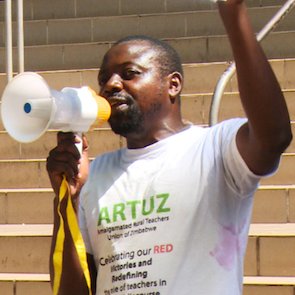…bleak future as second republic commits ‘educational genocide’
Melinda Kusemachibi/ Emmanuel Chitsika
Zimbabwean educational sector used to be ranked among giants on the African continent, making most countries green with envy with the way the country produced academic intellectuals ready to invade any market on the global arena.
The country used to churn out complete and competent graduates to meet the requirements in the global job markets.
However, the former citadel of academic prowess seems to be slowly turning into a shadow of former self with a number of forces at play, ranging from job actions by educators over poor remuneration as well as boycotting marking of Advanced and Ordinary level examinations among other issues.
The ongoing impasse over improvement of salaries between government and teachers, with the battle culminating into the former resorting to use of threats and suspensions to the striking employees serves no good to the sector.
The spilling into the High Court of the suspension of educators by their employer is also another cause for concern with educators approaching the courts seeking redress over ‘illegal suspension’ by the employer and technically on whether the Ministry of Primary and Secondary Education has the authority to suspend employees who belong to the Public Service Commission (PSC).
ZIMSEC markers downed tools in protest allegedly accusing the examination body of acting in bad faith by failing to honour their part by paying their allowances in hard currency instead of the local one a factor that could stall the release of the 2021 Ordinary and Advanced level results after grade 7 results were delayed as well.

Renowned educationist Elijah Chitsika said the education system is in the intensive care unit (ICU) with no workable solution in sight to put the system on a proper trajectory as government and teachers seem not to find each other.
“There seems to be no sincerity on the part of government which has developed a culture of attempting to address the teachers’ grievances at the last minute always. Teachers had their grievances on the employer’s table since last year if not beyond and government had more than ample time since last year to address them during normal holidays as well as Covid-19 induced extensions.
“A number of questions prop up like: Is government serious about the welfare of teachers, To what extent are teacher unions genuine representatives of teachers, are teachers seriously concerned about their welfare, to what extent are parents as key stakeholders in education concerned about the education of their children and does the country have enough resources to sustainably improve teachers’ welfare?
“It is realistic to state that the powers that be have no commitment to solving the teachers’ problems. Whatever solutions are provided, are piecemeal solutions that do not aim to genuinely improve teachers’ welfare. The teacher is the hungry man that knows what he needs but government is a ‘heartless master’ who offers wrong solutions that do not genuinely improve their welfare,” said Chitsika.
He also said the new dispensation has taken down the education system towards a decline.
“I t is a mere fallacy for our government to clamour that our education system is the best on the continent. The Second Republic has set our education system on a serious decline. There is a possible danger of lowering our grading system to give a false impression of a sustained high pass rate.
“The current impasse between Zimsec and markers does not do well to the already wounded education system. Zimsec, like government has also shown itself to be a ‘dishonest employer’. Zimsec has not been able to honour the allowance promises made to markers. Markers who own an important niche in the country’s education system are a very demoralized force and hence this compromises their output. All these developments come at a time when a new dimension in form of Continuous Assessment of Learning Activities (CALA) was introduced and with this current pace at which markers are moving, learning time is lost as teachers are occupied at marking centres than the classroom,” he added.
Veteran educationist Cabnson Magaya concurred with Chitsika and said the education sector in Zimbabwe is now underrated.
“We are not happy with the education sector in Zimbabwe as it is depriving the rights of children to education. Teachers are now into extra lessons as most children cannot afford to pay for extra lessons. Since communication is important government, Zimsec and teachers should communicate in order to resolve those issues,” said Magaya.

Progressive Teachers Union of Zimbabwe (PTUZ) secretary general Raymond Majongwe said government should reconsider their stance and treat teachers with the dignity they deserve.
“Teachers deserve to be treated with dignity and respect as they are on national duty. Zimsec should not treat teachers like workers at a tobacco farm in 1923,” said Majongwe.

Amalgamated Rural Teachers Union of Zimbabwe (ARTUZ) president Obert Masaraure indicated that Zimsec should fulfill its mandate it signed with the teachers.
“Zimsec should honor its contractual obligation signed with the examiners. The current impasse threatens to destroy the credibility of examinations. The evaluation process is no longer trusted. These examiners are already underpaid and are only asking for timely payment of the paltry allowances. The use of force by the Zimbabwe Republic Police should also stop forthwith.
“These allowances they promised are supposed to sustain the teachers while marking. If they do not get 100percent who is going to pay for the rest. Zimsec should pay these allowances in full,” said Masaraure.
Contacted for comment, Zimsec Public Relations Officer Nicholette Dhlamini said Zimsec markers were not on strike.
“Examiners were not striking but they were calling for a general meeting in which we engaged with them and resolved the issue. We never promised to pay them in US$ even the contracts they signed, we indicated that they will receive ZW$,” said Dhlamini.
The Public Service Commission (PSC) who is the employer of the civil service was also quoted in sections of the media emphasising on their tough stance to rid the service of teachers resisting the call to go back to work.
PSC secretary Ambassador Jonathan Wutawunashe said disciplinary measures shall be taken against defaulting teachers.
“The few civil servants who are reported to be absconding will face frim disciplinary measures,” said Ambassador Wutawunashe.
Such use of a commandist approach by the employer speaks volumes about their commitment to break the deadlock by amicably engaging teachers to map the way forward. The stance which follows barely a week after the High court ruled in favour of striking teachers by nullifying Minister of Primary and Secondary Education’s (MoPSE) decision to suspend the former.
Efforts to get a comment from PSC secretary Ambassador Jonathan Wutawunashe proved fruitless as his mobile number went unanswered while WhatsApp messages were not responded to.
Teachers reportedly stated that Zimsec agreed to pay them US$25 a day for those staying out of residence and US$12 per day for those in residence but instead they only received ZW$19 000 and ZW$9 500 for 28 days of marking respectively prompting them to protest.
Last year government forcibly re-introduced CALA in both primary and secondary schools without the consent of various key stakeholders including school administrators and teachers as well which left many people pondering about the future success of the programme.
